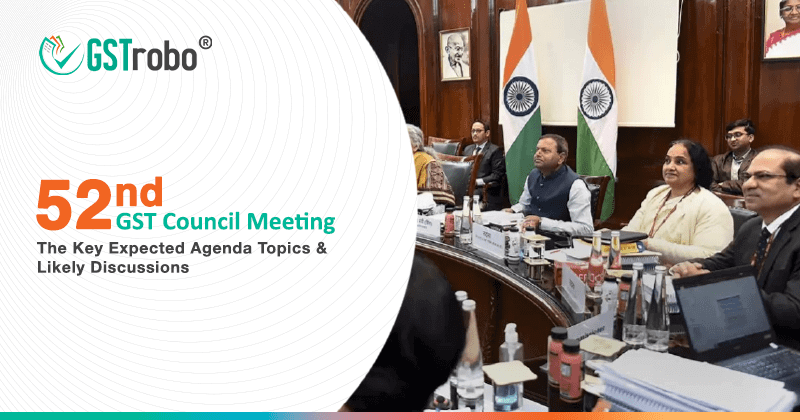52nd GST Council Meeting: The Key Expected Agenda Topics & Likely Discussions
The 52nd GST Council Meeting date is scheduled for 7th October 2023, in the capital city, New Delhi, under the leadership of Union Finance Minister Shrimati Nirmala Sitharaman. The Goods and Services (GST) Council, along with the indirect tax authority, will be participating in the meeting to discuss the focused key agendas for the next six months.

This time, the 52nd GST Council meeting 2023 will focus on two main agendas:
28% GST on Online Gaming
In the 51st GST Council Meeting, 28% GST was levied on the face value of online gaming, horse race clubs, and casinos. It was also mentioned that further amendments to central GST and integrated GST will be discussed.
The authorities asked the offshore e-gaming companies to start registering themselves under the GST law. Further, these companies are prone to access blocking under the law on registration non-compliance.
Notices to implement the stated amendments have already been sent to the states under the CGST law, and the last date to comply with the law is 1st October.
With discussions expected on this amendment, the authority is likely to monitor the progress of the same and suggest further measures for the smooth implementation of the amended provisions.
GST Appellate Tribunal Bench
Another agenda for the 52nd GST Council meeting 2023 is the discussions and decisions regarding the technical aspects of the GST appellate tribunal setup. This was also a key agenda that was finalized at the 51st GST Council Meeting 2023.
In September 2023, the GST Council passed a bill to create 31 GST appellate tribunal benches nationwide. This tribunal’s primary purpose is the speedy resolution of people’s GST disputes and complaints related to ITC claims, ITC refunds, GST input tax credit availability, and ocean freight, to name a few.
With a quick set of tribunals in various states, businesses can expect immediate resolution of their grievances, lessening the burden of Honourable High Courts of states. Similarly, the GST disputes between states and the central will also encounter speedy resolves.
Uttar Pradesh will have three benches, while Karnataka and Rajasthan will each have two, and one designated for northeastern states.
These tribunal benches will include representation from central and state authorities, marking a significant milestone in the GST framework as it provides a dedicated destination for resolving disputes.
At the 52nd GST Council Meeting 2023, the progress of GST appellate tribunal benches will be assessed, and further action plans will be implemented.
Other Likely Discussions at the 52nd GST Council Meeting
It will be interesting to see what other discussions might take place at the GST 52nd council meeting, looking at the recently successful G20 summit where the Honourable Prime Minister Shri Narender Modi raised the need for expansion and inclusion concerning the Digital Public Infrastructure and the necessity of ONDC’s involvement in sectors like financial services and Fintech industry to make India’s tax system and financial sector one with the agenda of One Nation, One Tax.
It will also be seen if Shrimati Nirmala Sitharaman discusses aspects like two pillar taxation solutions and the question of debt distress, two agendas at the 52nd GST Council meeting 2023.
Under the finance track of G20, the two pillar taxation solutions were included:
- A mechanism to support the timely and adequate mobilization of climate finance resources.
- Scaling up sustainable finance for social sectors like health and education.
- Having global conversations on transition policies.
On the other hand, before G20, the Union Finance Minister emphasized the question of debt distress,
“Given the consideration of things and the developments worldwide, we thought we should address this question of debt distress. The World Bank and the IMF have ways of extending help to such states, but they consume much time in giving relief. So, all this was in our mind when we said we have to take up the issue of debt.”
She stressed, “Sebi (Securities and Exchange Board of India), with what it does, is able to see the grain from the chaff. Regulatory tools, if used properly, coming out of this can lead to better corporate governance. There is no harm if India can also benefit from better corporate governance.”
Earlier in the month, she shared her opinion on the G20 summit, where she mentioned how India has ‘walked the talk’ under the G20 presidency. She mentioned,
“The key achievements of the finance track under the Indian G20 presidency include a plan to strengthen the Multilateral Development Banks (MDBs) to address shared challenges, laying down the building blocks for a globally coordinated policy and regulatory framework for crypto assets, gaining financial inclusion and productivity gains through digital public infrastructure, debt resolution for lower and middle-income countries, and financing cities of tomorrow, among others,” the finance minister said.
Conclusion
With SEBI’s concerns over the offshore tax havens along with upcoming advancements in DPIs, debt distress, resource mobilization, financial sustainability, and the need for better, more significant, and more effective Multilateral Development Banks (MDBs), it will be exciting to see the upcoming discussions of 52nd GST Council Meeting 2023.
